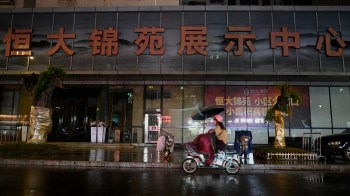Wall Street’s gut punch comes from the East
China’s in the middle of what’s essentially a government-imposed credit crunch. The government there sticking its finger in a giant lending bubble. China’s benchmark Shanghai Composite closed down 5.3 percent on Monday. Markets are not the whole picture of America’s economy, of course, but what’s happening in China’s banking system will impact the real economy here, with the potential to create both winners and losers.
In fact, as China’s loan situation goes, so goes Barbiere’s Italian Inn in South Milwaukee, Wis. Actually, it’s about what’s across the street from the popular eatery, the Caterpillar plant where workers make mining equipment that scoops up raw materials to feed Chinese industry. Business from CAT makes up 20 percent of the restaurant’s revenue, so manager Matt Willers keeps an eye on world economic news.
“Oh, constantly,” he stresses. “Around here you can’t help but be immersed in what’s going on globally.”
The kitchen that churns out wave after wave of pizza and pasta orders is a window to how CAT’s doing, both from the perspective of employees and the global clients the company wines and dines. “We get a fair amount of people from other countries, not just China,” says Willers. “We get them from Germany and Australia and Brazil.”
Caterpillar is high on the list of American companies that could suffer in a Chinese credit crunch. If big Chinese firms can’t get easy money, there will be less mining and construction, which is bad for CAT and ultimately, the nearby Italian joint.
But the fuller picture is bigger and more complex. Tighter credit could mean Chinese firms have much less to spend on raw materials that power their businesses. “It also means cheaper commodities and long-run, that might not be such a bad thing,” says FTN Financial chief economist Chris Low, who has spent time in China.
That could mean lower energy costs for American consumers and businesses. Tighter lending in China will hurt banks there, but not necessarily Chinese consumers. A credit crunch could accelerate China’s transition to an economy relying less on big projects funded with cheap money, and more on Chinese consumers buying things, including American stuff.
“By and large, what American companies wanna sell to China is consumer goods,” explains Patrick Chovanec, chief strategist at Silvercrest Asset Management and a former Tsinghua University business professor. “An adjustment in China, however severe it might be, to more of a consumption driven economy in the long run actually benefits most American companies.”
It’s a shift that’ll have impact around the world, even under the stamped-tin ceiling of a Wisconsin Italian restaurant.
There’s a lot happening in the world. Through it all, Marketplace is here for you.
You rely on Marketplace to break down the world’s events and tell you how it affects you in a fact-based, approachable way. We rely on your financial support to keep making that possible.
Your donation today powers the independent journalism that you rely on. For just $5/month, you can help sustain Marketplace so we can keep reporting on the things that matter to you.


















